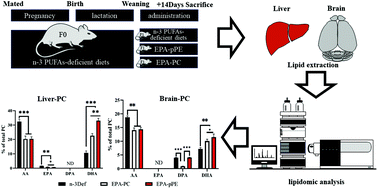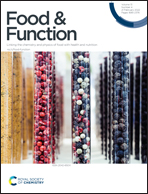Short-term supplementation of EPA-enriched ethanolamine plasmalogen increases the level of DHA in the brain and liver of n-3 PUFA deficient mice in early life after weaning†
Abstract
A lack of n-3 polyunsaturated fatty acids (PUFAs) in mothers’ diet significantly reduced the amount of docosahexaenoic acid (DHA) in the brains of offspring, which might affect their brain function. Our previous research has proven multiple benefits of eicosapentaenoic acid (EPA)-enriched ethanolamine plasmalogen (pPE) in enhancing the learning and memory ability. However, the effect of dietary supplementation with EPA-pPE on the DHA content in the brain and liver of offspring lacking n-3 PUFAs in early life is still unclear. Female ICR mice were fed with n-3 PUFA-deficient diets throughout the gestation and lactation periods to get n-3 PUFA-deficient offspring. The lipid profiles in the cerebral cortex and liver of offspring were analyzed using lipidomics after dietary supplementation with EPA-pPE (0.05%, w/w) and EPA-phosphatidylcholine (PC) (0.05%, w/w) for 2 weeks after weaning. Dietary supplementation with EPA could significantly change fatty acid composition in a variety of phospholipid molecular species compared with the n-3 deficient group. EPA-pPE and EPA-PC remarkably increased the DHA content in the brain PC, ether-linked phosphatidylcholine (ePC), and phosphatidylethanolamine plasmalogen (pPE) and liver triglyceride (TG), lyso-phosphatidylcholine (LPC), ePC, phosphatidylethanolamine (PE), and pPE molecular species, in which EPA-pPE showed more significant effects on the increase of DHA in cerebral cortex PC, ePC and liver PC compared with EPA-PC. Both EPA-phospholipids could effectively increase the DHA levels, and the pPE form was superior to PC in the contribution of DHA content in the cerebral cortex PC, ePC and liver PC molecular species. EPA-enriched ethanolamine plasmalogen might be a good nutritional supplement to increase DHA levels in the brains of n-3 PUFA-deficient offspring.



 Please wait while we load your content...
Please wait while we load your content...